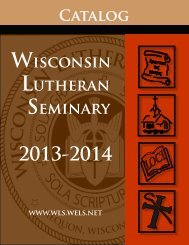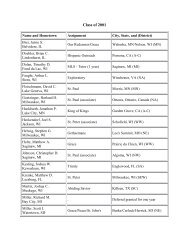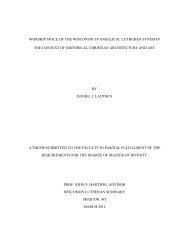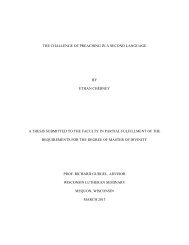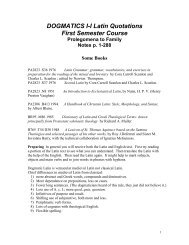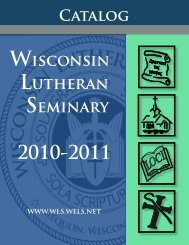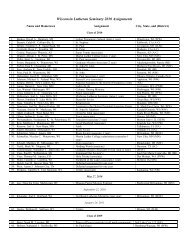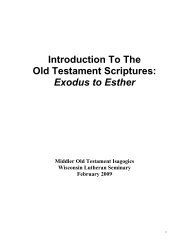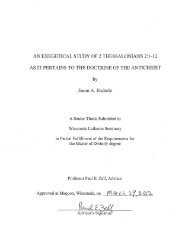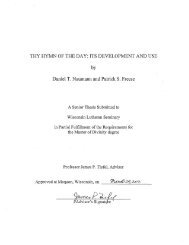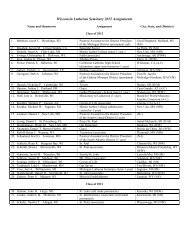Untitled - Wisconsin Lutheran Seminary - WELS
Untitled - Wisconsin Lutheran Seminary - WELS
Untitled - Wisconsin Lutheran Seminary - WELS
You also want an ePaper? Increase the reach of your titles
YUMPU automatically turns print PDFs into web optimized ePapers that Google loves.
a moral universe by those who close their eyes to the truth.” 102<br />
In his commentary, Martin<br />
expounds on this ἐνέργειαν πλάνης and names two suggestions as to how this “powerful<br />
delusion” is to be understood:<br />
It is most commonly taken as a new element in the passage, a revelation that God, in the<br />
last days, will actively confuse the reasoning of the lost and guarantee their<br />
condemnation. …It is also possible, however, to see the “powerful delusion” as a<br />
103<br />
reference to the coming of the lawless one.<br />
Trying to define this “work of delusion” is not necessary. God simply confirms them in their<br />
unbelief and their condemnation. This sense of God confirming people in their unbelief is<br />
nothing new in Scripture. God hardened Pharaoh’s heart only after Pharaoh hardened it<br />
himself. 104 Paul in his letter to the Romans makes a number of statements in this respect,<br />
For although they knew God, they neither glorified him as God nor gave thanks to him,<br />
but their thinking became futile and their foolish hearts were darkened. …Therefore God<br />
gave them over in the sinful desires of their hearts to sexual impurity for the degrading of<br />
their bodies with one another.…Because of this, God gave them over to shameful<br />
lusts.…Furthermore, since they did not think it worthwhile to retain the knowledge of<br />
God, he gave them over to a depraved mind, to do what ought not to be done (Ro<br />
1:21,24,26a,28).<br />
Martin explains the clause here in this way: “God does not cause their unbelief, but he does set<br />
the stage for them to demonstrate it and thus openly earn their own condemnation.” 105<br />
The preposition εἰς here used with an articularized infinitive expresses purpose, “so that.”<br />
The infinitive clause here is an infinitive with the accusative construction in which the accusative<br />
pronoun αὐτοὺς becomes the subject of the infinitive verb πιστεῦσαι, “they believe in.” The verb<br />
here takes the dative object τῷ ψεύδει, indicating that they believe what the lie says. Wanamaker<br />
1982), 174.<br />
102 F.F. Bruce, World Biblical Commentary. Vol. 45, 1 & 2 Thessalonians (Waco, TX: World Books,<br />
103 D. Michael Martin, 1, 2 Thessalonians. Vol. 33, The New American Commentary (Broadman & Holman<br />
Publishers, 1995), 248-249.<br />
104 “When Pharaoh saw that the rain and hail and thunder had stopped, he sinned again: He and his officials<br />
hardened their hearts. So Pharaoh’s heart was hard and he would not let the Israelites go, just as the LORD had said<br />
through Moses.…But the LORD hardened Pharaoh’s heart, and he would not let the Israelites go.” (Ex 9:34-35;<br />
10:20)<br />
105 D. Michael Martin, 1, 2 Thessalonians. Vol. 33, The New American Commentary (Broadman & Holman<br />
Publishers, 1995), 247.<br />
48



